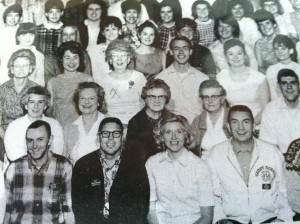Summers are always times of great transition for some subset of the population. On the young end of the scale, people are graduating, moving, getting married. On the older end, children are leaving home, or it’s a time of career change, or retirement. Life is fluid enough that it seems new chapters come along with astonishing regularity, so that the only thing that remains constant in our lives is the reality that they’re changing.
Since that’s just the way it is, I was pondering whether there are any principles that might help people navigate the whitewater rapids of change more smoothly, making such seasons redemptive rather than paralyzing or destructive? As I think about change in my own life (this morning being the week after my youngest graduated from college) I can see that there are 5 perspectives that have helped me through previous new chapters, which I need to maintain for this new season. These perspectives are timeless, and will help each of us navigate the waters of change with grace and joy:
1. Look ahead, not behind. The most pathetic person in film might just be Rico, from Napolean Dynamite, the guy who is perpetually longing to return to high school. Time moved on. Context moved on too, but he never did. In the Bible, it’s Israel in the wilderness that begins to romanticize the past as they moan and groan and long for the onions and garlic of Egypt.
Romanticizing the previous chapter of life, as good as it might have been, will always make moving into the future more difficult. When Israel came up to the challenges of the entering God’s land, they flat out refused, choosing instead to pursue a return to yesterday, which for them meant returning to the known. Here’s the thing though: you can’t go back!
Just graduated? College will never look the same.
Just had a baby? Those blissful days of traveling light, without children will be back, in 20 or 25 years!
Children just finished school? Their “leaving for kindergarten” pictures might warm your soul, but thankfully they’ve learned to think their own thoughts and live their own lives.
For me, a key to moving on is to untangle my identity from my context. I loved having small children, but that can’t be my identity. I love being a pastor and teacher and hope to be one for a long time, but that too can’t be my identity. My meaning needs to come from Gandalf’s call: “What matters most is what we do with the time we’ve been given”, which means this time, this season, this chapter. Keep that perspective and you’ll become like Joshua, the one always willing to say yes to God’s future, rather than hanging on to some mythical static past.
2. Choose your revelation. The Bible is clear over and over again that all of our transformation is response to revelation. That’s why we need to pay to attention to the quality of revelation we put in front of us. What are you reading? Are you developing habits of prayer, or journaling, or Bible study? Since all of life is revelation, the media we digest, the friends we develop, the creation we enjoy, will transform us – for better or worse.
It helps me to recognize my own propensity to be somewhat scattered in this area and swim upstream against my own heart. As a result, on my best days, I’ll turn off yet another Frazier re-run, in favor of a Flannery O’Conner short story, for example.
3. Make room for wholeness. We’re not just souls or spirits. Neither are we just bodies. We’re whole people and our food choices affect our capacity to serve, give, be present with people. So do our choices to move or perpetually sit. If this is an area where you need some help, then make this a priority, because somehow our misunderstanding of the gospel makes it easy to avoid caring for our bodies. “Dust to dust” we say, as we stuff another stick of fried cheese in our mouth and down it with some cola. Wrong move! We’ll pay for those choices in every area of life – body, soul, and spirit! Here’s a guide, or I use a “workout of the day” app for my phone to guide me. Lots of people find it better to go to a gym or workout with a partner. The important thing is simply to remember that you’re a whole person and in an age of indoor living and autos, you need to make yourself move.
4. Use Your Gifts. The apostle Paul tells young Timothy to “stir up the gift” which is his way of saying, “spend plenty of time developing the skills you’ve been given, rather than trying to develop skills you wish you had, but don’t. Go deep with your gifts; they’re the means through which you’ll bless the world. Paul says it again in Romans, and my paraphrase of his words would be: “Are you a writer? Then write every day! Do you love serving people? Find ways to do that – get involved. Do you teach well? Then teach! Do you love to make money so that you can live generously? Go for it! Find something and go deep, rather than playing at 10 things. If you need help finding your gifts, the chapter, “Finding Your Voice” in this book will help.
5. Clear Eyes. The most mission critical part of my day is identifying my MIT’s (most important things) When I do that, I’m able to say no to distractions and focus. When I don’t, I’ll find myself passively sucked into a black hole of wasted time and wonder, at the end of the day, what happened to this precious gift of 24 hours. Resting isn’t a problem; in fact it’s required, as is recreation (see #3), and laughter, and friendships. Still, it’s of great value to be able to say, “Today will be a win if I…. 1) ___ 2) ___ 3) ___ – and then set out on the adventure of living.
I met with someone recently who said he was working on the “final third” which was his way of saying, at 60 years old: “What’s next?” There will always be new chapters, and to the extent that we develop these perspectives, they’ll always be an adventure.











